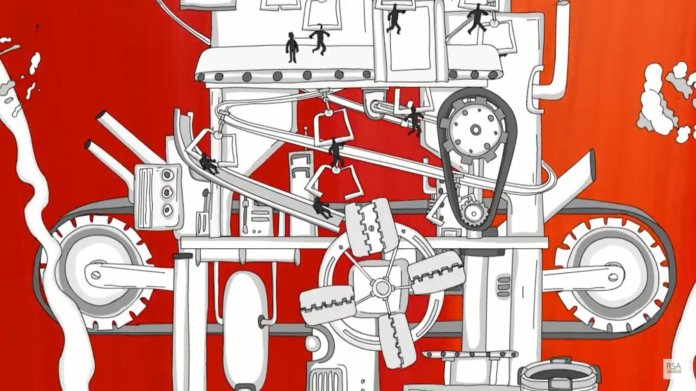What makes your work valuable?
Does it fulfill you? Allow you to connect with or help people? Contribute to a greater good?
Or does its value come from your income, which allows you to do other meaningful things?
You probably know someone who has a bullshit job. Maybe you have one yourself. Anthropologist David Graeber estimates 20 to 30 percent of the workforce feels their jobs are meaningless, and he’s calling for an end to the era of bullshit jobs.
Graeber’s call to overhaul how we think about work introduces a twist to the ongoing debate about automation. Computers and robots are taking over more jobs, and in the process they’re rendering human employees obsolete. But what if large-scale automation is just the push we need to take our concept of work in a new direction?
Graeber urges us to think about what we consider valuable in work to begin with, and he examines how our ideology of work has evolved over time.
In the 19th century, he says, there was an industrial-based labor theory of value. Men worked in factories to produce physical goods, and their work was valuable because of those goods. Male muscle and sweat got things done, and thus became the paradigm for all work.
Obviously, though, there’s value in work by males that doesn’t involve sweat and muscle, not to mention work by females. In the 20th century, the labor theory of value was replaced by the idea that productivity comes from entrepreneurs. People have ideas, and with those ideas they invent products or services that make our lives easier.
But then our lives got easier to the point where many of us can sit at a desk all day rather than work in a factory. If we’re not producing physical goods, and we’re not inventing a new product or service, what makes our work valuable?
We decided work is valuable in itself. It gives us the satisfaction of earning a living. It’s a good feeling seeing that bimonthly check hit your bank account and knowing you worked for it, isn’t it? Work builds character, makes us stronger and more well-rounded, no matter what it is we’re doing.
In fact, Graeber argues, bullshit jobs actually became a virtue; they require more discipline since they’re not interesting or enjoyable. And that’s where we are now: we value meaningless jobs for their very meaninglessness.
But what does it do to our morality and motivation to feel that eight hours of our time each day goes down the drain? Meanwhile jobs that do give people satisfaction, like those involving caring for others, are often poorly paid.
Graeber says, “We are at the brink of a re-formulation of what work is and what is valuable about it. It could lead to a reformulation of how we organize everything.”
So maybe the specter of automation is coming at the right time, and it won’t be as bad as people fear. What if, instead of phasing out all human work, automation just gets rid of the mindless, boring jobs?
Even if that’s the case, though, it won’t mean we’ll all end up with fulfilling, well-paid work. Each of us has a different set of abilities and interests; not everyone’s cut out to be a doctor, lawyer, or entrepreneur (nor does a society need more than a given number of these). Similarly, if mindless work is taken over by machines, not every displaced employee will become an artist, musician, or inventor.
Experts have predicted that at least some portion of the time and energy freed up by automation will be channeled into innovation, creativity, and diversification of interests.
It’s yet to be seen what the economic structure of such a society will look like, as well as how motivation and incentives will be affected. If we have the opportunity to eliminate bullshit jobs and find out, we should probably take it.
Image Credit: The Royal Society of Arts



